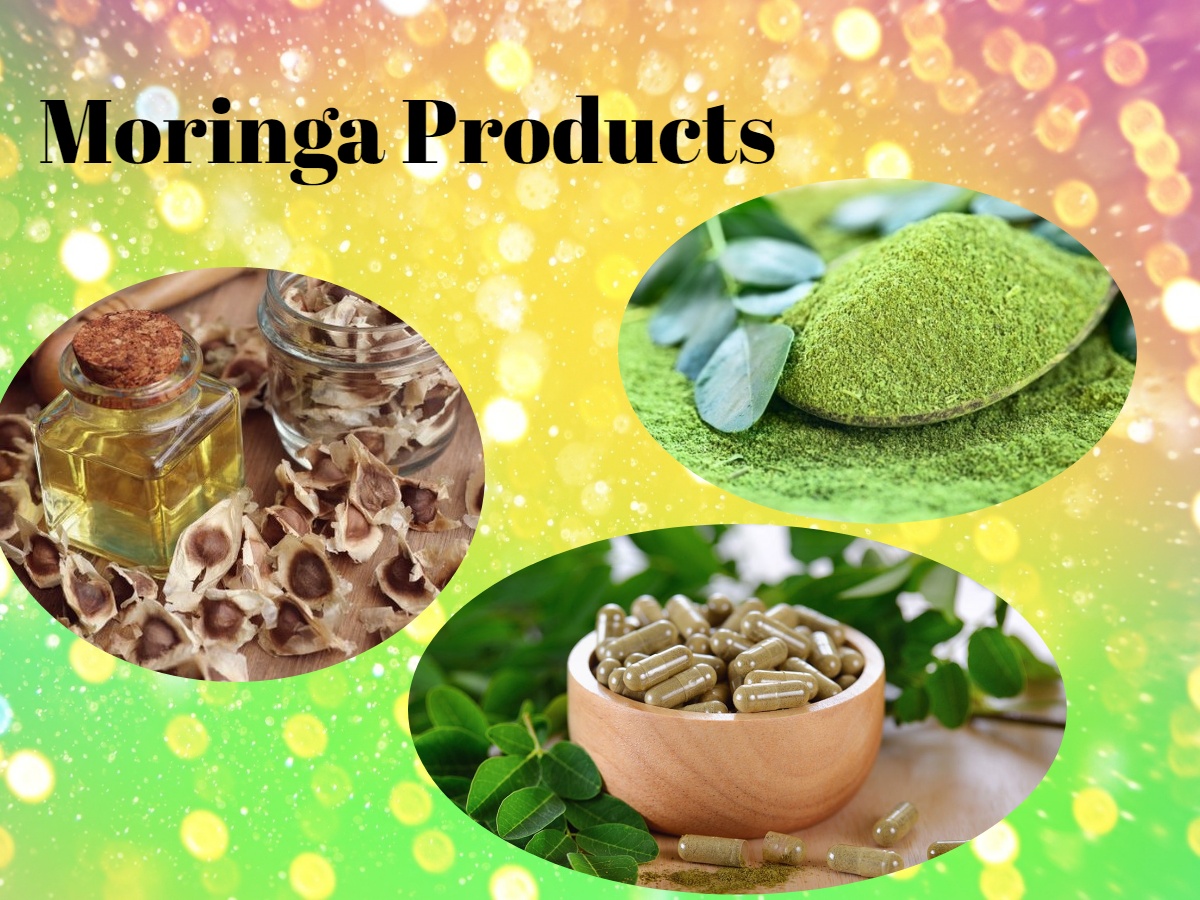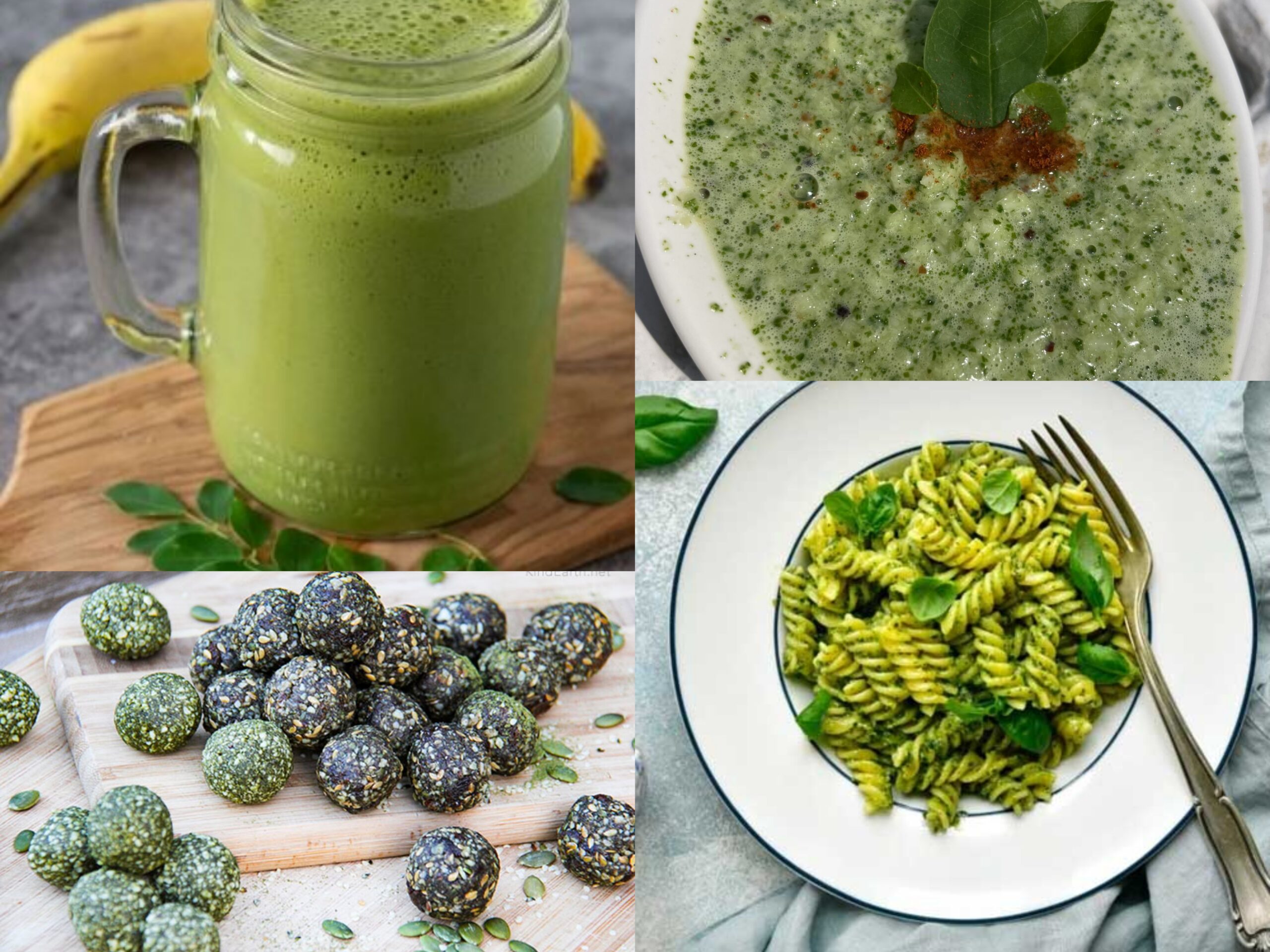Supercharge your diet with the nutritional genius of Moringa leaf powder, a superfood that promises to elevate your health and wellness journey. This article explores the incredible benefits and ways to incorporate Moringa into your daily routine.
Introduction to Moringa Leaf Powder
Moringa Oleifera, often hailed as the ‘miracle tree,’ is a plant that has been praised for its health benefits for thousands of years. It is rich in healthy antioxidants and bioactive plant compounds that make its leaves, when powdered, a potent dietary supplement. Supercharging your diet with the nutritional genius of Moringa leaf powder can offer a multitude of health benefits, from boosting your immune system to enhancing your energy levels.
The Nutritional Profile of Moringa Leaf Powder
Vitamins
- Vitamin A: Essential for healthy vision, immune function, and skin health.
- Vitamin C: A powerful antioxidant that supports immune health, skin health, and wound healing.
- Vitamin E: Contributes to healthy skin and eyes and strengthens the body’s natural defense against illness and infection.

Minerals
- Calcium: Crucial for bone health and muscle function.
- Potassium: Important for blood pressure regulation, heart health, and proper muscle and nerve function.
- Iron: Essential for the creation of red blood cells and transportation of oxygen throughout the body.
- Magnesium: Supports muscle and nerve function, blood sugar control, and blood pressure regulation.
Protein
- Moringa leaf powder is a good source of plant-based protein, which is vital for muscle repair, growth, and maintenance. It contains all nine essential amino acids, making it a complete protein, which is rare for a plant source.
Antioxidants
Moringa is rich in antioxidants such as quercetin, chlorogenic acid, and beta-carotene. These compounds help combat oxidative stress in the body, which is linked to chronic diseases like heart disease, type 2 diabetes, and Alzheimer’s. Antioxidants also play a role in reducing inflammation and protecting against cell damage.
Fiber
- It contains a significant amount of dietary fiber, which is beneficial for digestive health. Fiber helps to keep the digestive system running smoothly, prevents constipation, and can aid in weight management by promoting a feeling of fullness
Amino Acids
- Moringa contains 18 amino acids, including all nine essential amino acids, making it a complete protein. This is especially important for vegetarians and vegans who may struggle to get all essential amino acids from plant-based sources alone.
Chlorophyll
- Moringa is high in chlorophyll, which has various health benefits, including detoxification properties, wound healing, and supporting healthy liver function.
Omega-3 Fatty Acids
- Although not as concentrated as in some other superfoods, Moringa contains omega-3 fatty acids, which are essential for brain health, reducing inflammation, and lowering the risk of heart disease.
Benefits of Incorporating Moringa into Your Diet
Boosts Immune System
Moringa is packed with vitamins A and C, which are crucial for maintaining a healthy immune system. Vitamin C stimulates the production of white blood cells that fight infections, while vitamin A ensures the integrity of our skin and mucous membranes, serving as a first line of defense against pathogens.
Rich in Antioxidants
Antioxidants are compounds that fight free radicals in your body, which can cause oxidative stress and may lead to chronic diseases such as heart disease and type 2 diabetes. Moringa leaf powder is rich in antioxidants, including quercetin, chlorogenic acid, and beta-carotene, which help protect the body against damage from free radicals.
Promotes Heart Health
Moringa has been shown to have beneficial effects on heart health. It contains powerful antioxidants that can help lower blood pressure, reduce cholesterol levels, and prevent the formation of plaque in the arteries, reducing the risk of heart disease.
Enhances Digestive Health
The high fiber content in Moringa helps to promote a healthy digestive system. Fiber aids in digestion and prevents constipation by maintaining a healthy gut microbiome. Additionally, Moringa has been reported to have anti-inflammatory properties that can help reduce inflammation in the gut.
Supports Brain Health
Moringa contains compounds that can support brain health. Its high antioxidant content can reduce neuron degeneration and improve brain function. Additionally, Moringa is rich in vitamins E and C, which can fight oxidation that leads to neuron degeneration, improving brain health.
Aids Weight Management
Moringa can be a valuable addition to a weight loss diet. Its high fiber content can make you feel fuller for longer, reducing the urge to snack between meals. Furthermore, Moringa’s ability to improve insulin sensitivity may help manage blood sugar levels, reducing cravings and aiding in weight management.
Anti-inflammatory Properties
Chronic inflammation is associated with many health conditions, including heart disease, cancer, and type 2 diabetes. Moringa contains isothiocyanates, which have been shown to possess anti-inflammatory properties, helping to reduce inflammation in the body.
Improves Energy Levels
Moringa is a natural energy booster, without the sugar and caffeine found in traditional energy supplements. Its high iron content helps to prevent anemia, a common cause of fatigue, while its range of B vitamins supports metabolism and energy production.
Supports Bone Health
With its high calcium and phosphorus content, Moringa promotes strong, healthy bones. It also contains magnesium and vitamin K, which are essential for bone health, making it an excellent supplement for preventing osteoporosis and other bone conditions.
Skin and Hair Benefits
Moringa’s high vitamin A content is crucial for healthy skin and hair. Vitamin A promotes the growth of healthy skin cells, reducing signs of aging. The vitamin E in Moringa protects the skin against damage from the sun and environmental pollution.

How to Integrate Moringa Powder into Your Daily Diet
Start with Smoothies
One of the easiest and most popular ways to consume Moringa powder is by blending it into smoothies. Its mild taste can be easily masked by the flavors of fruits and vegetables. Add a teaspoon of Moringa powder to your favorite smoothie recipe for a nutritional boost.
Enhance Your Breakfast
Sprinkle Moringa powder over your morning oatmeal, yogurt, or cereal. This not only adds vital nutrients to the first meal of the day but also introduces a subtle earthiness that complements the natural sweetness of breakfast foods.
Power-Packed Teas and Juices
Stir a teaspoon of Moringa powder into a glass of water, juice, or tea. It dissolves easily, making it a convenient way to increase your antioxidant intake. For a refreshing twist, add lemon and honey to a Moringa-infused tea.
Soups and Stews
Moringa powder can be incorporated into soups and stews without altering their flavor profile. Add it towards the end of the cooking process to preserve its vitamins and minerals. This method ensures that you receive the full benefits of Moringa without compromising the taste of your dish.
Baking with Moringa
Incorporate Moringa powder into baked goods such as bread, muffins, and pancakes. Its green hue might tint your creations, but it’ll imbue them with healthful properties. Substitute a small portion of flour with Moringa powder in your recipes.
Salad Dressings and Sauces
Mix Moringa powder into salad dressings or sauces for an easy nutrient upgrade. Whether it’s a vinaigrette or a creamy dressing, Moringa can enhance the nutritional value of your salads without being overpowering.
Energy Bars and Balls
For a quick and healthy snack, incorporate Moringa powder into homemade energy bars or balls. Combine it with ingredients like nuts, seeds, oats, and dried fruits to create nutritious snacks perfect for on-the-go energy boosts.
Experiment with Seasoning
Use Moringa powder as a seasoning for meats, vegetables, or rice dishes. Its subtle flavor can add a nutritional punch to your meals without significantly changing their taste. It’s an excellent way to enrich your diet with essential nutrients subtly.
Moringa-Infused Dips
Add Moringa powder to hummus, guacamole, or any other dip to increase its health benefits. This not only adds a dose of nutrients but also gives your dips an interesting color and a hint of earthiness.
Start Small
If you’re new to Moringa, start with a small amount to see how your body reacts. Gradually increase the quantity as you become accustomed to its effects and flavor.
The Science Behind Moringa’s Health Benefits
Rich Nutritional Profile
Moringa leaves are packed with essential nutrients. They are a significant source of vitamins A, C, and E, calcium, potassium, and protein, making Moringa a powerful supplement for combating malnutrition. Vitamin A supports eye health and immune function, Vitamin C boosts immunity and skin health, while Vitamin E has antioxidant properties that protect the body from oxidative stress.
Antioxidant Powerhouse
Moringa leaves are rich in antioxidants such as quercetin, chlorogenic acid, and beta-carotene. These compounds fight free radicals in your body, reducing oxidative stress and lowering the risk of chronic diseases such as heart disease and type 2 diabetes. Chlorogenic acid, in particular, has been shown to help moderate blood sugar levels after meals.
Anti-inflammatory Effects
Inflammation is an essential response to injury or infection, but chronic inflammation can lead to serious health issues, including heart disease and cancer. Moringa contains isothiocyanates, which are bioactive compounds known for their anti-inflammatory properties. These compounds help suppress inflammatory enzymes and proteins in the body, offering protection against inflammation.
Heart Health
The nutrients in Moringa can have a significant positive effect on heart health. Its high antioxidant content helps to prevent lipid peroxidation, which is a key factor in the development of heart disease. Moringa also contains niaziminin, a compound that has been linked to the prevention of arterial thickening, reducing the risk of hypertension and heart disease.
Blood Sugar Regulation
Moringa has been found to help lower blood sugar levels, which is crucial for the prevention and management of diabetes. Compounds in Moringa, including chlorogenic acid, help to regulate blood sugar by affecting how cells take up or release glucose. This helps in maintaining a normal blood sugar level, which is essential for overall health.
Cholesterol Lowering
Moringa has been shown to have a cholesterol-lowering effect. Its consumption can lead to a reduction in cholesterol levels, similar to the effect of many cholesterol-lowering drugs. Lowering cholesterol levels reduces the risk of heart disease.
Protective Against Neurodegenerative Diseases
The high levels of antioxidants in Moringa may protect against neurodegenerative diseases. It has been suggested that Moringa extracts have a neuroprotective effect, potentially due to its ability to inhibit the production of brain plaques associated with Alzheimer’s disease.
Antimicrobial and Detoxifying Properties
Moringa exhibits antimicrobial and antibacterial properties, making it effective against the growth of pathogens and bacteria. Furthermore, Moringa’s high content of chlorophyll has been suggested to have a detoxifying effect on the body, helping in the cleansing of the blood and supporting liver function.
Supporting Digestive Health
Moringa’s fiber content, along with its isothiocyanates, help support the digestive system. Fiber promotes regular bowel movements and a healthy digestive tract, while the anti-inflammatory properties can alleviate digestive disorders such as gastritis or constipation.
Impact on Immune Function
The rich blend of vitamins, minerals, and antioxidants in Moringa strengthens the immune system. Its high vitamin C content, in particular, enhances the body’s natural defense mechanism, reducing the risk of illness and infection.

Potential Side Effects and Considerations
Digestive Upsets
For some individuals, incorporating Moringa into the diet might initially lead to digestive upsets such as stomach aches, gas, or diarrhea. This is often due to the high fiber content of Moringa, which, while beneficial for digestive health, can cause issues in some people when consumed in large quantities initially. It’s recommended to start with smaller amounts and gradually increase the intake to allow the digestive system to adjust.
Potential Interactions with Medications
Moringa has been found to affect the way the body processes certain medications due to its high vitamin and mineral content. For instance, because Moringa can lower blood sugar levels, it might enhance the effects of diabetes medications, leading to hypoglycemia. Similarly, its ability to lower blood pressure could interact with antihypertensive drugs. It’s crucial for individuals on medication to consult with a healthcare provider before adding Moringa to their diet.
Effects on Pregnancy and Breastfeeding
There is limited research on the effects of Moringa during pregnancy and breastfeeding. While Moringa leaves are often consumed for their nutritional benefits, the root, bark, and flowers of Moringa might contain compounds that can cause contractions in pregnant women. It’s generally advised for pregnant women to avoid Moringa supplements or consult a healthcare provider before use.

Allergic Reactions
Though rare, some individuals might experience allergic reactions to Moringa. Signs of an allergic reaction could include rash, hives, difficulty breathing, or swelling. Anyone who experiences these symptoms after consuming Moringa should discontinue use immediately and seek medical advice.
Immunosuppressive Effects
While Moringa is known for boosting the immune system, there’s some evidence suggesting that in extremely high doses, it might have immunosuppressive effects. This is an area that requires more research, but it suggests that moderation is key when incorporating Moringa into your diet, especially for individuals with autoimmune diseases or those on immunosuppressive medication.
Antifertility Potential
Some animal studies have suggested that high doses of Moringa seed extract might have antifertility effects. However, these effects are primarily associated with the extract from Moringa seeds, not the leaf powder commonly used for dietary supplements. Still, individuals concerned about fertility might want to exercise caution and consult with a healthcare provider.
Quality and Source Considerations
The safety and efficacy of Moringa also depend on its source and quality. Contaminated or poorly processed Moringa products might contain harmful bacteria or heavy metals. It’s important to choose high-quality, organic Moringa leaf powder from reputable suppliers to minimize the risk of contamination and ensure the product is safe for consumption.
Supercharge Your Diet with the Nutritional Genius of Moringa Leaf Powder
Cornucopia of Nutrients
Moringa leaf powder is unparalleled in its nutrient density. It contains high levels of vitamin A, essential for maintaining healthy vision, skin, and immune function, and vitamin C, a powerful antioxidant that aids in repairing tissues and enzymatic production of certain neurotransmitters. Furthermore, it’s rich in calcium and iron, which are crucial for bone health and preventing anemia, respectively. Moringa also boasts a complete profile of essential amino acids, making it a rare plant-based source of complete protein, vital for muscle repair, growth, and maintenance.
Antioxidant Abundance for Optimal Health
The power of Moringa extends into its antioxidant capabilities, thanks to compounds like quercetin, chlorogenic acid, and beta-carotene. These antioxidants combat oxidative stress and inflammation, underlying factors in many chronic diseases, including heart disease and type 2 diabetes. Regular consumption of Moringa can help mitigate these risks, promoting overall health and longevity.
A Natural Detoxifier and Immunity Booster
Moringa leaf powder is also recognized for its detoxifying effects, attributed to its ability to purify water and air of toxins and impurities. When consumed, it can similarly cleanse the body, supporting liver function and enhancing the body’s natural detoxification processes. Moreover, its high nutrient content strengthens the immune system, making it more adept at warding off infections and diseases.
Weight Management and Metabolic Health
Incorporating Moringa into your diet can also aid in weight management and improve metabolic health. Its leaves are low in fat and high in dietary fiber, which promotes a feeling of fullness, reduces cravings, and aids in digestion. Additionally, Moringa has been shown to reduce fat formation and enhance fat breakdown, further supporting weight management efforts.
Enhancing Mental Clarity and Energy Levels
Moringa’s benefits extend to mental health, where it has been found to enhance brain health, thanks to its high content of antioxidants and neuro-enhancer activities. It can improve cognitive function and memory and has been used in traditional medicine to treat mood disorders like depression and anxiety. Furthermore, Moringa’s rich iron and vitamin A content can improve energy levels, making it an excellent addition to the diet of those dealing with fatigue.
Easy Incorporation into Daily Diet
The versatility of Moringa leaf powder allows for easy integration into your daily diet. It can be added to smoothies, juices, teas, and even soups and stews, enriching your meals with its nutritional benefits without compromising taste. Starting with a teaspoon a day can be a good way to introduce it to your diet, gradually increasing the amount as your body adapts.

Comparing Moringa with Other Superfoods
Moringa vs. Chlorella
Chlorella, another green algae, is often lauded for its detoxifying properties, particularly in removing heavy metals from the body. It shares many nutritional similarities with Moringa, such as high levels of proteins and essential amino acids. Yet, Moringa surpasses chlorella in its accessibility and ease of incorporation into diets, given its powder form that can be easily added to various dishes. Additionally, Moringa offers a more pleasant taste compared to chlorella’s somewhat strong algae flavor, making it a more palatable option for everyday use.
Moringa vs. Matcha
Matcha, a type of finely ground green tea, is renowned for its high antioxidant content, particularly epigallocatechin gallate (EGCG), which is linked to numerous health benefits, including reduced risk of heart disease and certain types of cancer. While matcha is an excellent source of antioxidants, Moringa provides a broader spectrum of nutrients, including vitamins, minerals, and all essential amino acids, making it a more comprehensive dietary supplement. Moreover, Moringa’s lower caffeine content compared to matcha makes it suitable for those looking to limit their caffeine intake while still reaping similar antioxidant benefits.
The Unique Benefits of Moringa
Moringa leaf powder distinguishes itself with its impressive nutrient density, offering more calcium, vitamin A, and iron than most other superfoods. Its versatility in culinary applications also stands out, as it can be seamlessly added to a variety of dishes without altering their flavor significantly. Furthermore, Moringa’s benefits extend beyond nutrition, with studies suggesting its potential in supporting heart health, reducing inflammation, and enhancing lactation, making it a multifaceted addition to a healthy lifestyle.

Sustainable Sourcing and Environmental Impact
Sustainable Cultivation of Moringa
Moringa oleifera, often simply called Moringa, is a fast-growing, drought-resistant tree native to parts of Africa and Asia. Its resilience to harsh growing conditions makes it an ideal crop for sustainable farming practices. Moringa requires minimal water compared to other crops, significantly reducing the water footprint associated with its cultivation. Moreover, it can grow in poor soil conditions where other crops might not survive, helping to combat soil degradation and encourage biodiversity.
Environmental Benefits of Moringa Cultivation
The cultivation of Moringa has several positive impacts on the environment. Its ability to grow quickly and in arid conditions means it can provide cover and restore vegetation in areas at risk of desertification. Moringa trees also help in carbon sequestration, absorbing carbon dioxide from the atmosphere, which contributes to mitigating climate change. Additionally, the Moringa tree’s deep root system can help prevent soil erosion, preserving soil health and water quality in agricultural regions.
Supporting Local Communities
Sustainable sourcing of Moringa not only benefits the environment but also supports the livelihoods of local farmers and communities in the regions where it is grown. By choosing Moringa products sourced from small-scale, ethical farms, consumers can contribute to improving the economic stability of these areas. Fair trade practices ensure that farmers receive a fair price for their crops, promoting social equity and economic development in often marginalized rural communities.
Challenges and Solutions in Sustainable Sourcing
Despite its many benefits, sustainable sourcing of Moringa faces challenges, including the risk of overharvesting and the need for ethical labor practices. To address these issues, many companies are turning to certified organic and fair trade Moringa products. These certifications ensure that Moringa is grown without harmful pesticides or fertilizers and that workers are paid fair wages and work in safe conditions. Consumers can contribute to sustainable sourcing by choosing products that are transparent about their cultivation and labor practices.
The Future of Moringa and Sustainability
As the popularity of Moringa continues to grow, so does the importance of ensuring its sustainable and ethical production. Innovations in agroforestry and permaculture practices offer promising pathways to increase the sustainability of Moringa cultivation. By integrating Moringa trees into diverse farming systems, farmers can improve soil health, enhance biodiversity, and create more resilient agricultural ecosystems.
FAQs
How does Moringa taste?
Moringa has a mild, earthy flavor that can easily be masked when mixed with other ingredients in smoothies, soups, and baked goods.
Can Moringa replace multivitamins?
While Moringa is nutrient-dense, it should complement a balanced diet rather than replace multivitamins, especially for those with specific nutritional needs.
Is Moringa safe for everyone?
Moringa is safe for most people when consumed in recommended amounts. However, individuals with specific health conditions or pregnant women should consult a healthcare provider.
How long does it take to see benefits?
The benefits of Moringa can vary from person to person. Some may notice improvements in energy levels and overall well-being within a few weeks, while for others, it might take longer.
Can I grow Moringa at home?
Yes, Moringa trees are relatively easy to grow in warm climates, and they can be cultivated at home for personal use.
Where can I buy high-quality Moringa powder?
High-quality Moringa powder can be found in health food stores, online retailers, and specialty shops. Look for organic and ethically sourced products for the best quality.
Conclusion
Moringa leaf powder is a versatile and powerful superfood that can make a significant difference in your health and well-being. Its rich nutritional profile and numerous health benefits make it a worthy addition to any diet. Whether you’re looking to boost your immune system, manage your weight, or simply improve your overall health, Moringa leaf powder offers a natural and effective solution. Start incorporating Moringa into your diet today and experience the transformative power of this nutritional genius.










